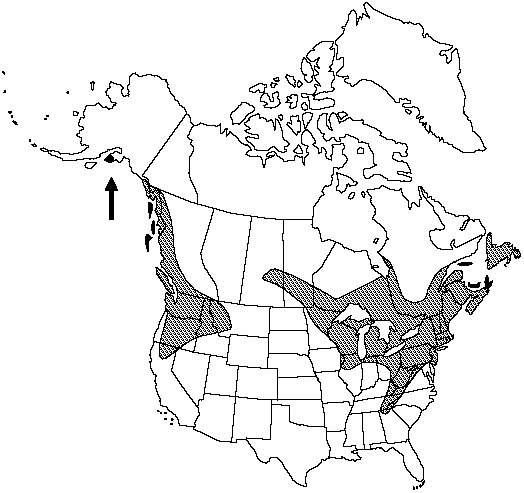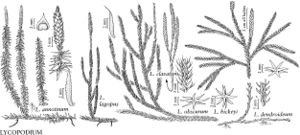Difference between revisions of "Lycopodium clavatum"
Sp. Pl. 2: 1101. 1753.
FNA>Volume Importer |
GeoffLevin (talk | contribs) m (Deleted extraneous text in discussion) |
||
| (8 intermediate revisions by 2 users not shown) | |||
| Line 12: | Line 12: | ||
|name=Lycopodium clavatum var. subremotum | |name=Lycopodium clavatum var. subremotum | ||
|authority=Victorin | |authority=Victorin | ||
| + | |rank=variety | ||
}} | }} | ||
|hierarchy=Lycopodiaceae;Lycopodium;Lycopodium clavatum | |hierarchy=Lycopodiaceae;Lycopodium;Lycopodium clavatum | ||
| Line 20: | Line 21: | ||
}}<!-- | }}<!-- | ||
| − | --><span class="statement" id="st- | + | --><span class="statement" id="st-undefined" data-properties=""><b>Horizontal </b>stems on substrate surface. <b>Upright</b> shoots clustered, 0.6–1.2 cm diam., dominant main shoot with 3–6 branches mostly in lower 1/2. <b>Lateral</b> branchlets few and like upright shoots; annual bud constrictions abrupt, branchlets mostly spreading. <b>Leaves</b> spreading, often somewhat ascending in distal 1/3 of branches, medium green, linear, 4–6 × 0.4–0.8 mm; margins entire; apex with narrow hair tip 2.5–4 mm. <b>Peduncles</b> 3.5–12.5 cm, with remote pseudowhorls of appressed leaves, loosely branched into 2–5 alternate stalks, 0.5–0.8 cm. <b>Strobili</b> 2–5 on alternate stalks (if double, usually with stalks 5–8 mm), 15–25 × 3–6 mm. <b>Sporophylls</b> 1.5–2.5 mm, apex abruptly reduced to hair tip. <b>2n</b> = 68.</span><!-- |
-->{{Treatment/Body | -->{{Treatment/Body | ||
|habitat=Fields and woods | |habitat=Fields and woods | ||
|elevation=100–1800 m | |elevation=100–1800 m | ||
| − | |distribution=St. Pierre and Miquelon;B.C.;Man.;N.B.;Nfld.;N.S.;Ont.;P.E.I.;Que.;Sask.;Alaska;Calif.;Conn.;Ga.;Idaho;Ill.;Ind.;Ky.;Maine;Md.;Mass.;Mich.;Minn.;Mont.;N.H.;N.J.;N.Y.;N.C.;Ohio;Oreg.;Pa.;R.I.;Tenn.;Vt.;Va.;Wash.;W.Va.;Wis.;Mexico;West Indies;Central America;South America;Europe;Asia;Africa;Pacific Islands. | + | |distribution=St. Pierre and Miquelon;B.C.;Man.;N.B.;Nfld. and Labr. (Nfld.);N.S.;Ont.;P.E.I.;Que.;Sask.;Alaska;Calif.;Conn.;Ga.;Idaho;Ill.;Ind.;Ky.;Maine;Md.;Mass.;Mich.;Minn.;Mont.;N.H.;N.J.;N.Y.;N.C.;Ohio;Oreg.;Pa.;R.I.;Tenn.;Vt.;Va.;Wash.;W.Va.;Wis.;Mexico;West Indies;Central America;South America;Europe;Asia;Africa;Pacific Islands. |
| − | |discussion=<p>Plants found in eastern North America have been called Lycopodium clavatum var. clavatum; those in the western part of the range, which have been called L. clavatum var. integrifolium Goldie, are distinguished by early shedding of the characteristic hairs on the leaf tips.</p><!-- | + | |discussion=<p>Plants found in eastern North America have been called <i>Lycopodium clavatum</i> <i></i>var.<i> clavatum</i>; those in the western part of the range, which have been called <i>L. clavatum</i> <i></i>var.<i> integrifolium</i> Goldie, are distinguished by early shedding of the characteristic hairs on the leaf tips.</p><!-- |
| − | -- | + | --> |
|tables= | |tables= | ||
|references= | |references= | ||
| Line 36: | Line 37: | ||
-->{{#Taxon: | -->{{#Taxon: | ||
name=Lycopodium clavatum | name=Lycopodium clavatum | ||
| − | |||
|authority=Linnaeus | |authority=Linnaeus | ||
|rank=species | |rank=species | ||
| Line 45: | Line 45: | ||
|habitat=Fields and woods | |habitat=Fields and woods | ||
|elevation=100–1800 m | |elevation=100–1800 m | ||
| − | |distribution=St. Pierre and Miquelon;B.C.;Man.;N.B.;Nfld.;N.S.;Ont.;P.E.I.;Que.;Sask.;Alaska;Calif.;Conn.;Ga.;Idaho;Ill.;Ind.;Ky.;Maine;Md.;Mass.;Mich.;Minn.;Mont.;N.H.;N.J.;N.Y.;N.C.;Ohio;Oreg.;Pa.;R.I.;Tenn.;Vt.;Va.;Wash.;W.Va.;Wis.;Mexico;West Indies;Central America;South America;Europe;Asia;Africa;Pacific Islands. | + | |distribution=St. Pierre and Miquelon;B.C.;Man.;N.B.;Nfld. and Labr. (Nfld.);N.S.;Ont.;P.E.I.;Que.;Sask.;Alaska;Calif.;Conn.;Ga.;Idaho;Ill.;Ind.;Ky.;Maine;Md.;Mass.;Mich.;Minn.;Mont.;N.H.;N.J.;N.Y.;N.C.;Ohio;Oreg.;Pa.;R.I.;Tenn.;Vt.;Va.;Wash.;W.Va.;Wis.;Mexico;West Indies;Central America;South America;Europe;Asia;Africa;Pacific Islands. |
|reference=None | |reference=None | ||
|publication title=Sp. Pl. | |publication title=Sp. Pl. | ||
|publication year=1753 | |publication year=1753 | ||
|special status= | |special status= | ||
| − | |source xml=https:// | + | |source xml=https://bitbucket.org/aafc-mbb/fna-data-curation/src/2e0870ddd59836b60bcf96646a41e87ea5a5943a/coarse_grained_fna_xml/V2/V2_661.xml |
|genus=Lycopodium | |genus=Lycopodium | ||
|species=Lycopodium clavatum | |species=Lycopodium clavatum | ||
| − | |||
| − | |||
| − | |||
| − | |||
| − | |||
| − | |||
| − | |||
| − | |||
| − | |||
| − | |||
| − | |||
| − | |||
| − | |||
| − | |||
| − | |||
| − | |||
| − | |||
| − | |||
| − | |||
| − | |||
| − | |||
| − | |||
| − | |||
| − | |||
| − | |||
| − | |||
| − | |||
| − | |||
| − | |||
| − | |||
| − | |||
| − | |||
}}<!-- | }}<!-- | ||
-->[[Category:Treatment]][[Category:Lycopodium]] | -->[[Category:Treatment]][[Category:Lycopodium]] | ||
Latest revision as of 19:01, 22 February 2022
Horizontal stems on substrate surface. Upright shoots clustered, 0.6–1.2 cm diam., dominant main shoot with 3–6 branches mostly in lower 1/2. Lateral branchlets few and like upright shoots; annual bud constrictions abrupt, branchlets mostly spreading. Leaves spreading, often somewhat ascending in distal 1/3 of branches, medium green, linear, 4–6 × 0.4–0.8 mm; margins entire; apex with narrow hair tip 2.5–4 mm. Peduncles 3.5–12.5 cm, with remote pseudowhorls of appressed leaves, loosely branched into 2–5 alternate stalks, 0.5–0.8 cm. Strobili 2–5 on alternate stalks (if double, usually with stalks 5–8 mm), 15–25 × 3–6 mm. Sporophylls 1.5–2.5 mm, apex abruptly reduced to hair tip. 2n = 68.
Habitat: Fields and woods
Elevation: 100–1800 m
Distribution

St. Pierre and Miquelon, B.C., Man., N.B., Nfld. and Labr. (Nfld.), N.S., Ont., P.E.I., Que., Sask., Alaska, Calif., Conn., Ga., Idaho, Ill., Ind., Ky., Maine, Md., Mass., Mich., Minn., Mont., N.H., N.J., N.Y., N.C., Ohio, Oreg., Pa., R.I., Tenn., Vt., Va., Wash., W.Va., Wis., Mexico, West Indies, Central America, South America, Europe, Asia, Africa, Pacific Islands.
Discussion
Plants found in eastern North America have been called Lycopodium clavatum var. clavatum; those in the western part of the range, which have been called L. clavatum var. integrifolium Goldie, are distinguished by early shedding of the characteristic hairs on the leaf tips.
Selected References
None.
